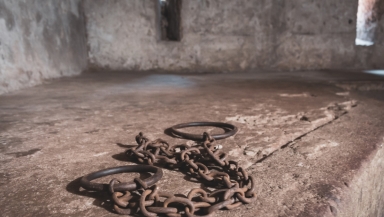
The issue of whether reparations should be made for British involvement in the transatlantic slave trade has come to the fore again as a result of the recent report from the oversight group set up by the Church Commissioners (the body that manages the historic assets of the Church of England).
The report advises on the objectives and structure for a £100 million fund to provide seed capital for communities damaged by the legacy of the slave trade. The oversight group's report suggests that the sum of £100 million originally proposed is an insufficient figure and that there should instead be "a target of £1bn for a broader healing, repair and justice initiative with the fund at its centre".
The moral question raised by this report, as by other recommendations that reparations should be made for the transatlantic slave trade, is whether those living today have an obligation to make recompense for the involvement in it of people who are long since dead.
In the specific case of the Church Commissioners, the question is whether recompense ought to be offered for the investment in the slave trade by a fund called the Queen Anne's Bounty which was established in 1704 to provide support for poor Church of England clergy.
The managers of the Queen Annes's Bounty, whose funds eventually became part of the funds of the Church Commissioners, invested in the slave trade between 1715 and 1739 and the suggestion is that this historic investment creates an obligation to pay out money in the present and the future.
If we turn to the Bible for guidance on this matter, there is no doubt that it teaches the principle of making restitution for acts of wrongdoing. In the Old Testament this principle forms part of the Mosaic law.
Thus, Exodus 22:5-6 states: 'When a man causes a field or vineyard to be grazed over, or lets his beast loose and it feeds in another man's field, he shall make restitution from the best in his own field and in his own vineyard. When fire breaks out and catches in thorns so that the stacked grain or the standing grain or the field is consumed, he that kindled the fire shall make full restitution.'
In similar fashion Leviticus 6:2-5 declares: 'If any one sins and commits a breach of faith against the Lord by deceiving his neighbour in a matter of deposit or security, or through robbery, or if he has oppressed his neighbour or has found what was lost and lied about it, swearing falsely—in any of all the things which men do and sin therein, when one has sinned and become guilty, he shall restore what he took by robbery, or what he got by oppression, or the deposit which was committed to him, or the lost thing which he found, or anything about which he has sworn falsely; he shall restore it in full, and shall add a fifth to it, and give it to him to whom it belongs, on the day of his guilt offering.'
Likewise, in Numbers 5:5-7 we read: 'And the Lord said to Moses, 'Say to the people of Israel, When a man or woman commits any of the sins that men commit by breaking faith with the Lord, and that person is guilty, he shall confess his sin which he has committed; and he shall make full restitution for his wrong, adding a fifth to it, and giving it to him to whom he did the wrong.'
Moving on to the New Testament we also find the principle of making restitution in the story of Zacchaeus in Luke 19:1-10:
'[Jesus ] entered Jericho and was passing through. And there was a man named Zacchaeus; he was a chief tax collector, and rich. And he sought to see who Jesus was, but could not, on account of the crowd, because he was small of stature. So he ran on ahead and climbed up into a sycamore tree to see him, for he was to pass that way. And when Jesus came to the place, he looked up and said to him, 'Zacchaeus, make haste and come down; for I must stay at your house today.' So he made haste and came down, and received him joyfully. And when they saw it they all murmured, 'He has gone in to be the guest of a man who is a sinner.' And Zacchaeus stood and said to the Lord, 'Behold, Lord, the half of my goods I give to the poor; and if I have defrauded any one of anything, I restore it fourfold.' And Jesus said to him, 'Today salvation has come to this house, since he also is a son of Abraham. For the Son of Man came to seek and to save the lost.''
In this account the reality of Zacchaeus' having received salvation is shown by his willingness to obey the Mosaic law by making abundant restitution to anyone he had defrauded.
As the biblical commentator Matthew Henry puts it, what the specific mention of his fourfold act of restoration teaches is that: 'Those who are convinced of having done wrong cannot evidence the sincerity of their repentance but by making restitution. Observe, he does not think that his giving half his estate to the poor will atone for the wrong he has done. God hates robbery for burnt-offerings, and we must first do justly and then love mercy. It is no charity, but hypocrisy, to give that which is none of our own; and we are not to reckon that our own which we have not come honestly by, nor that our own which is not so when all our debts are paid, and restitution made for wrong done.'
The seventeenth century Archbishop of Canterbury John Tillotson makes a similar point in his sermon on these verses, declaring: 'One particular and eminent fruit of true repentance, is the making of restitution and satisfaction to those whom we have injured. As for God, we can make no satisfaction and compensation to him, for the injuries we have done him by our sins; all that we can do in respect of God, is to confess our sins to him, to make acknowledgment of our misdoings, to be heartily troubled for what we have done, and not to do the like for the future. But for injuries done to men, we may in many cases make reparation and satisfaction. And this, as it is one of the best signs and evidences of a true repentance; so it is one of the most proper and genuine effects of it: for this is as much as in us lies, to undo what we have done, and to un-sin our sins.'
What is also important to note, however, both in the case of the Old Testament laws and in the case of Zacchaeus, is the principle that it is the person who has committed wrongdoing who needs to make reparation and that the person to whom the reparation is to be made is the person who has been harmed.
As Thomas Aquinas declares, restitution is an act of 'commutative justice', that is, an act of justice between persons, which aims to equalize the loss that someone has endured and for this reason 'restitution must be made to the person from whom a thing has been taken.'
What we do not find in the Bible is any idea that the descendants of those who have committed acts of wrongdoing against others have an inherited obligation to make restitution for the wrongs that their forebears have committed. Zacchaeus needs to make reparation to those whom he has defrauded. The descendants of Zacchaeus do not, however, need to make reparation to the descendants of those whom he has defrauded.
As Kevin De Young puts it: 'The principle of restitution found in the story of Zacchaeus and in the Christian tradition is essential to Christian repentance and obedience, but the principle loses its biblical force (not to mention its simplicity) when it is no longer directed to the one who was defrauded, cheated, or stolen from.'
In the case of the transatlantic slave trade, the fact that, as far as Britain was concerned, the slave trade and the practice of slavery were abolished in the nineteenth century means that slave traders, slave owners and slaves themselves are all alike dead. There is therefore no one who directly owes anyone else restitution for having stolen their freedom or their labour by means of slavery.
In the light of this fact the argument that is often put forward is that the descendants of those who were enslaved are still suffering as a result of the enslavement of their ancestors, while the descendants of those involved directly or indirectly in the slave trade are still benefitting from the economic benefits it produced. Consequently justice demands that the latter should make compensation to the former.
However, as theologian and Oxford professor Nigel Biggar observes: 'The riotous jungle of history overgrows and obscures the causal pathways. In the case of British slavery, the victims themselves are, of course, all long dead and short of God, an afterlife and a final judgement – lie forever beyond the reach of compensation. As for their twenty-first century descendants, their present condition, while owing something to the enslavement of their ancestors, also owes much to events and choices in the almost two hundred years since emancipation.
'Can we be sure that they would have been better off had their ancestors remained in West Africa – some as slaves and sacrificial funeral fodder? Are there not some descendants of slaves who now prosper rather more than some descendants of slave owners? Have not some of the latter used their tainted inheritance for charitable purposes, perhaps even anti-slavery endeavours? And what, exactly, would proportionate compensation for historic sufferings of slavery look like?'
Since this is the case, philosopher Jeremy Waldron is right to declare that 'it is the impulse to justice now that should lead the way....not the reparation of something whose wrongness is understood primarily in relation to conditions that no longer obtain.'
What this means is that rather than arguing that a fund should be established to help people of African descent because of what happened in the past, a better argument would be that there are people who would benefit from the help that such a fund could offer and the overarching biblical command that we should love our neighbour (Leviticus 19:18) means that Christians should offer them such help if it is possible to do so.













